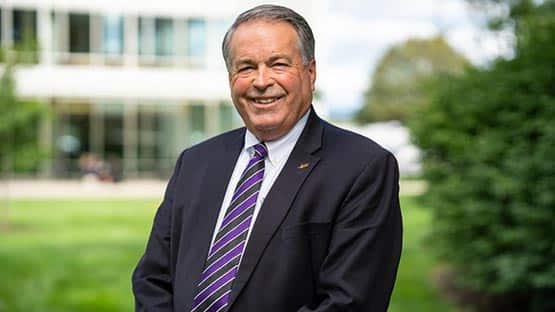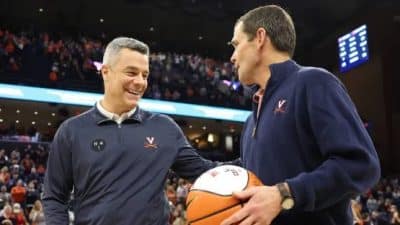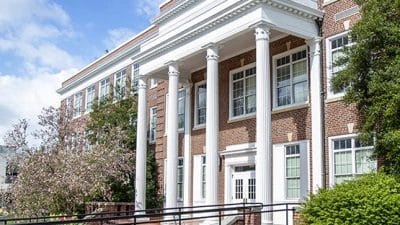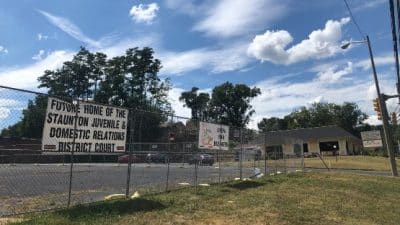The Top Story by Chris Graham
When Sen. Emmett Hanger, R-Mount Solon, brought up his concerns with respect to the No Child Left Behind education-accountability initiative during the news conference in 2003 in which he announced his candidacy for re-election to the Virginia General Assembly, it didn’t take long for fellow Republicans to paint a bull’s eye squarely on his back.
“I remember that I got kicked around quite a bit by some of my colleagues in the Republican Party for what I had to say there,” Hanger told The Augusta Free Press this week.
As it turns out, Hanger isn’t the only member of the Virginia GOP who feels that the federal education program – which features rigid performance standards for public schools across the country – has overextended the Washington bureaucracy’s reach into an area that has largely been under the purview of state and local government.
“Obviously, Congress has acted, and the president signed the bill into law. It’s the law of the land. That said, I’ve always had a philosophical problem with the federal government being involved in public education,” Del. Steve Landes, R-Weyers Cave, told the AFP.
“I don’t think the Constitution authorizes the federal government to play a role in education. It should be the responsibility of the states and local governments,” Landes said.
Another point of contention for both Landes and Hanger is how No Child Left Behind impacts on Virginia’s Standards of Learning program – which will be a focal point of the discussion that the two will have with U.S. Education Secretary Rod Paige next month in Washington.
Landes and Hanger are leading a delegation of state legislators to the nation’s capital to talk with Paige about ways the federal government can factor Virginia’s progress in the SOL arena into its formulas for mandated improvements under the No Child Left Behind regulations.
“The biggest problem from Virginia’s standpoint is that we already have an accountability program in place in the Standards of Learning, and that the federal requirements under No Child Left Behind don’t dovetail all that well with the state’s existing program,” Landes said.
“It wouldn’t be something that I would see as being problematic if the state didn’t have an accountability program in place,” Landes said.
But because Virginia had undertaken its efforts with the SOLs in advance of the implementation of No Child Left Behind, and had made appreciable progress in raising the bar in public education as a result, the state ends up being almost punished for its early SOL successes, Landes said.
“Most educators will tell you that once you get to a fairly high level of achievement, it’s really hard to make the kinds of gains that you can see early on in an improvement program,” Landes said.
A point of particular interest to Hanger, meanwhile, is related to the treatment of special-needs and English-as-a-second-language students – who are accounted for differently under the SOLs and No Child Left Behind.
“It’s a noble goal that no child be left behind, but in my mind, the way this program is administered doesn’t make sense. It doesn’t take into account that students come from different backgrounds and ability levels, for one thing,” Hanger said.
“Common sense would seem to dictate that students with different backgrounds and abilities and interests be treated differently, if only because the way it is right now, a student with no learning disabilities and a 130 IQ, to cite a for instance, has to pass the same tests that students with learning disabilities have to pass. From a commonsense standpoint, that just doesn’t work, but that’s the system that we have in place now,” Hanger said.
Hanger said he hopes the meeting with Paige will get the secretary to consider the Commonwealth’s stance on where it is relative to its SOL program.
“At the least, we’d like to get some kind of waiver for Virginia and other states that have accountability programs that are in place so that we can continue doing the things that we’ve been doing to bring accountability to public education,” Hanger said.
Del. Ben Cline, R-Rockbridge, said the meeting of Virginia legislators with Paige “is a good place to start, but in the long run, the federal government has to understand that what it needs to do is let Virginia build on the successes that it has seen with the SOLs. Period.”
“Virginia has shown that it is a leader in the movement to bring accountability to public education,” Cline told the AFP. “The federal government is only a hindrance in that process at this point in time. It’s my hope that the delegation will be able to convince the Department of Education to back off and let Virginia build on what has been a very successful accountability program.”
“Obviously in Virginia we’re doing what we feel is necessary to have accountability to parents and taxpayers that their children are getting the best possible education that they can receive,” Del. Chris Saxman, R-Staunton, told the AFP.
“Is there more that we can do here? Certainly. But are there changes that can be made to make the federal program work more smoothly and more efficiently? Definitely,” Saxman said.










